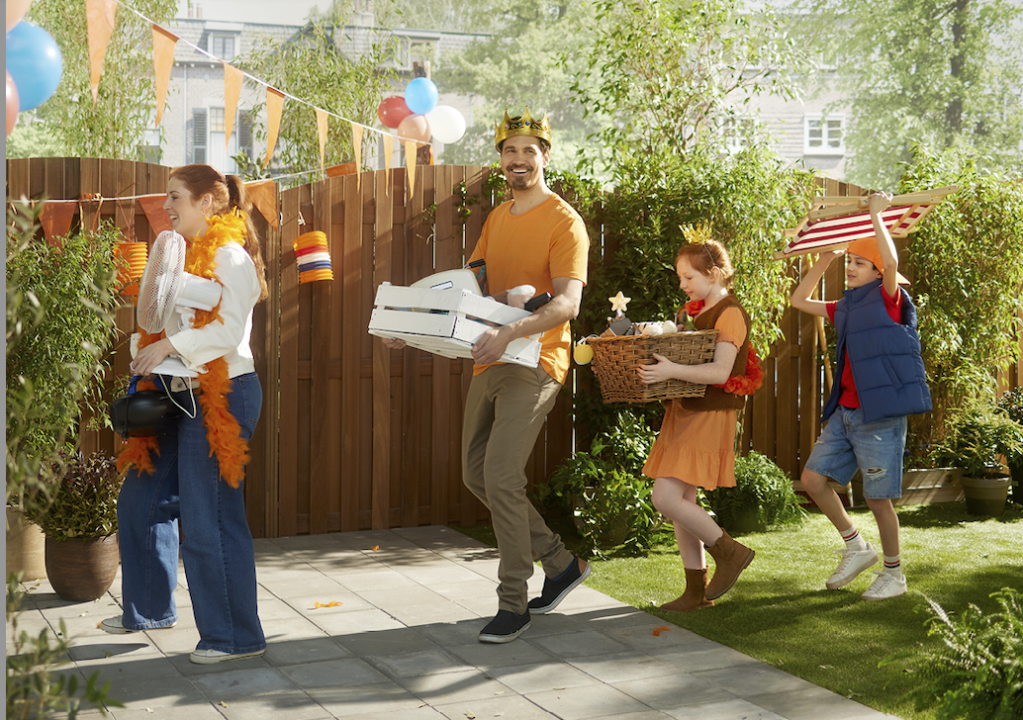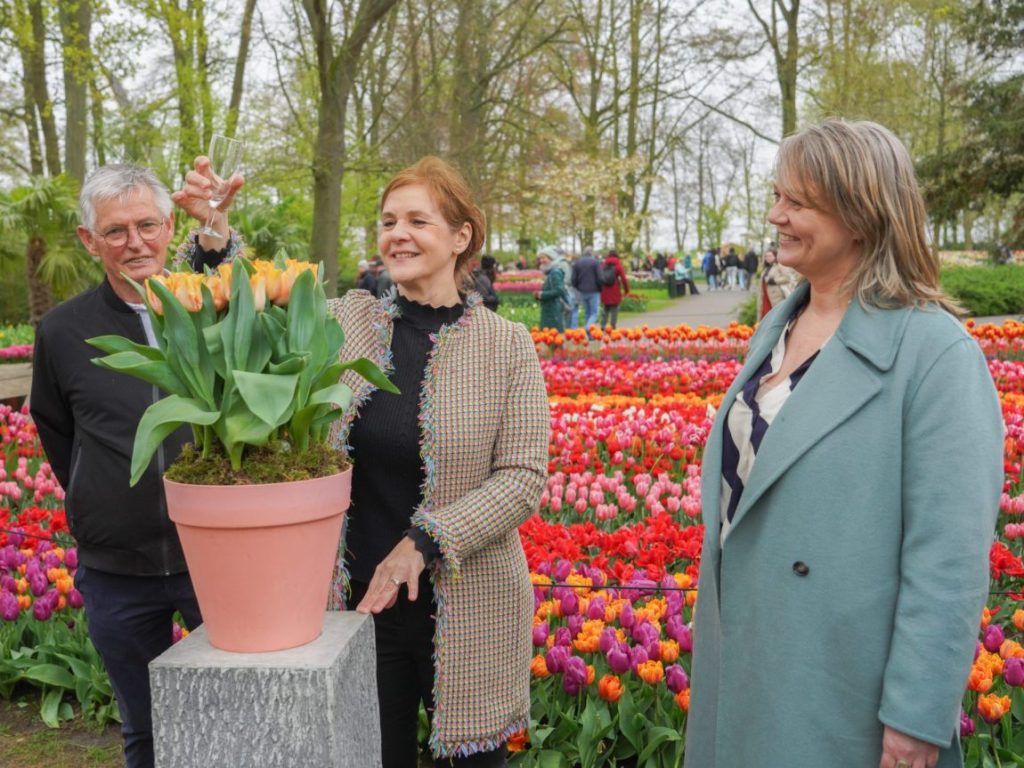I remember once, long before I became a mother, I went to a party at a friend’s house in Delft. Her children greeted me in Dutch, but when they heard me speaking English, they switched. They were completely comfortable in both languages and I remember remarking to my husband how cool it would be to have children who could do that. Now, I am raising bilingual children myself. This could easily become a whole series of posts, but I’ll start with a story of our family’s experiences so far.
Our eldest was born in Delft and we moved to Australia when she was 5 months old. I have always spoken English with her and my husband has always spoken Dutch. We did the same when our second came along two years later. This has been called the “one person [parent], one language” approach. We’re not incredibly strict with this, it depends on the situation and sometimes my husband will talk English and I will sometimes (less often) speak Dutch. One example is if we have a friend or another child over who only speaks one of the languages, we often all switch to that. Or when my husband’s parents would come to visit us in Australia, for about a month each year, they would hear mostly Dutch in our home.
When the girls were aged 3 & 5, we moved from Australia back to the Netherlands. At that stage, after being mostly surrounded by English-speakers, they were speaking English to each other. We have lived in The Hague approaching 4 years now, and I must say that I’m thrilled their default language with each other is still English. Considering they now go to a Dutch school and are surrounded mostly by Dutch-speakers daily, I’m very glad this English-language part of my own identity and culture has stayed such a big part of their life.
Another “trick” I’ve used is that when they ask to watch tv, sometimes I’ll allow it only if it’s in English. We have a big DVD collection and of course there is loads on YouTube. Perhaps due to this though, I now have one child that speaks with an American accent and one sounds more British!
What is very normal though is for them to throw the Dutch word into sentences when they don’t know the English one. Here’s a good example I just found from two years ago, where my youngest is going through a pile of artwork she did at school. At the time, she was 4 and a half, and had been in groep 1 at a Dutch school for about 7 months. We’d been living in the Netherlands for about 18 months. You’ll notice that I suggest the English word (nearly) each time she says a Dutch one. Watching this later, I realised I got one or two wrong! This is something we still do on a really regular basis in our daily conversations. Sometimes they will repeat the English word after me, sometimes just listen and move on….I never force it. If it’s a particularly difficult word, I may ask them if they can say it.
The issue that is starting to appear now though is with grammar, reading, writing and spelling. They speak English very well and to hear them, you’d likely assume (hopefully!) they are native speakers. However as English is not actually taught at their school, this is something I have realised I am going to have to take into my own hands.
A few years ago, I met a lovely Canadian lady in The Hague, Eowyn Crisfield. She is an expert in the field of bilingualism and bilingual education, with a B.Ed in Teaching English as a Second/Foreign Language, and a Master of Arts in Applied Linguistics. She works with educational institutions around the world and I learnt a lot from a presentation she gave a while ago in The Hague. You can read more over on her website, and she has an excellent blog: http://onraisingbilingualchildren.com
The thing I remembered most about this was that to raise children as a native speaker of a language, you really have to take it seriously, and dedicate time and energy to this. I started realising it was really important to me to have my children not only speak my language…but speak, read, write and understand my language as native speakers. I know that the majority of Dutch people speak English very well. However it’s very quickly obvious it’s a second language. Not just because it’s “my” language, but also because it’s an international language, I think one of the best gifts I can give my children is ensuring they are strong communicators in English.
I started talking to others about a year ago about this and had a lot of interesting perspectives. Many of my English-speaking friends, whether from an English-speaking country, or using English as a second (or third or fourth!) language themselves, have chosen to send their children to a predominantly English-speaking school. In The Hague, there are quite a few of these. Several are expensive private schools, catering mostly for expat children who are in the Netherlands short term. There are a couple of other Dutch or “International” schools that teach a certain percentage of classes in English or which start English lessons from a much younger age. For a few reasons, our children go to a totally Dutch-speaking school. In fact, so much so, that I was told recently – not by the school themselves but the after school care – that it was forbidden for my girls to speak English TO EACH OTHER! I completely understand they need to speak Dutch to the carers and the other children. However their default language with each other is English and them “messing” with this has caused a bit of stress in our family. That’s a whole other post I’ll leave for another time.
My girl’s teachers have always been generally supportive of the fact the girls are bi-lingual but are not able to offer much practical support. It’s not until groep 7 or 8 (when the girls are about 11) that they will start with basic English classes a few hours a week (if that).
Now the girls are getting older, I realise I need some help, particularly in helping them learn correct English grammar, and to read and write. I’ve also been surprised at how little I actually remember about the rules of English grammar and how unequipped I am to teach these skills to my own children.
So, I’m taking some action. A few months ago, I started a Facebook group (which now has over 100 members) to share experiences with and learn from others in a similar situation. There are many other families I’m starting to meet that are a lot like ours, and also Dutch or International parents who would like for their children to learn English at an earlier age. Just last week, I’ve started a new website “Kids English Club” where I plan on collecting various resources to support children and their parents in the Netherlands to practice and improve their English. I’ll start with the website but will also plan some events.
Thankfully, my girls are really interested and excited about this as a project. This in itself is making sure we dedicate a part of our week to the importance of developing English language skills.
I’m also realising how important my language is to me. Before, it was just something I took for granted. It’s really strange to me that my own children don’t speak with an Australian accent. In fact, I’m kind of losing mine and speaking a more “neutral” English I’ve been told. My language is part of my identity though. In fact, yesterday was the UN International Mother Language Day. It’s something I want to consciously make part of mine and my children’s lives.
If you have any ideas or experiences to share about raising bilingual (or multilingual) children, I’d love to hear it in a comment below!
Renee







Leave a comment